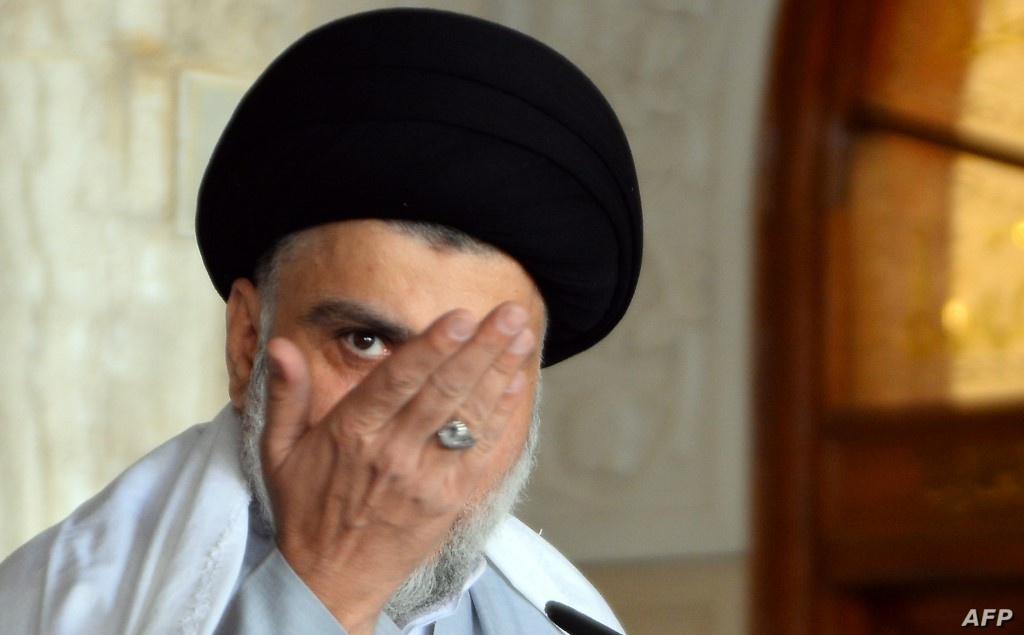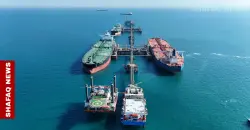Report: The limits of U.S. support for Iraq

Shafaq News / On Monday, President Joe Biden received Iraqi Prime Minister Mustafa al-Kadhimi at the Oval Office to strengthen bilateral relations and discuss matters of mutual interest, key among them being the future of US troops in Iraq. Despite widespread thinking that Iraq and the Middle East do not rank high in the mix of the Biden administration’s priorities, there have been clear signals that Iraq remains important enough to the United States and that Kadhimi and his government are partners that the United States can work with and should support. While most of the media attention focused on the announcement of the change in US force posture in Iraq, the key takeaway from this week’s meeting is that the United States and Iraq seek to maintain their strategic partnership — and build on it.
This was Kadhimi’s second visit to the White House in less than a year and he also met with Speaker Nancy Pelosi and other members of Congress. His visit follows last week’s round of US-Iraq strategic dialogues under the 2008 Strategic Framework Agreement and reaffirmed their cooperation in many areas including security, public health, economic cooperation, energy independence, humanitarian aid, human rights and cultural and educational exchanges, among other things.
As the nature of the US troop presence changes, the US-Iraq relationship has opportunities, but also faces various challenges that will best be addressed by enhancing this strategic partnership.
US TROOPS AND SECURITY COMPETITION
Both countries’ leadership wished to focus attention beyond security cooperation, but the future of US troops in Iraq was the issue of most interest for the media, Iraqis and regional actors. The strategic dialogue concluded with the reaffirmation that US troops are in Iraq at the invitation of the Iraqi government, which is committed to protecting the anti-ISIS coalition personnel, including US troops. Both countries agreed “that there will be no US forces with a combat role in Iraq by December 31, 2021.” Military personnel will remain to continue with a “training, advising, assisting and intelligence role.”
Iran-backed, anti-US groups have been mounting pressure on the Iraqi government to ensure talks will result in the withdrawal of US. troops. These groups have increased drone and rocket attacks on US troops and diplomatic facilities in Iraq. As the United States began withdrawing troops from Afghanistan and the Taliban quickly gained ground, concerns grew among Iraqis that a similar scenario may repeat in Iraq.
The continued US military presence and support, albeit not in a combat role, is reassuring for many Iraqi leaders and citizens. It signals that the United States will not disengage and pull military personnel out in the face of attacks. Iraqi security forces (ISF), including the Kurdish Peshmerga, will have the backing of a superpower still available as they build their capacity and continue to fight the remnants of the Islamic State group (ISIS) attempting a resurgence. The risk of vacuums that would be filled by regional actors, especially Iran and Turkey, will be minimized. Political leaders, especially the prime minister, would likely be more assertive domestically and externally knowing that America has their back somehow.
The outcome of the strategic dialogue, particularly setting the December date, was welcomed by many political forces, including Moqtada al-Sadr and the Fatah Coalition, which is considered as the political umbrella of Iran-backed groups. However, the so-called Iraqi resistance groups continued to express doubt or objection to what has been agreed or whether it’s even going to be implemented. At least in the immediate term, this seems to be a new development where a number of actors who share a common position against the US troops presence are now divided about interpretation of the announcement and how to deal with it.
Meanwhile, ordinary Iraqis are less interested in the troop debate, and care more about the ongoing challenges they face, some of which are exacerbated by the extreme summer.
IRAN
Iran is in a state of transition. On the domestic front, newly elected President Ebrahim Raisi will be inaugurated in August. Meanwhile, Tehran is in talks with the United States to revive the 2015 nuclear deal, while also trying to fill the gap that the US killing of Quds Force Commander Qassem Soleimani and Deputy Head of the Popular Mobilization Forces Abu-Mahdi al-Muhandis left behind. Regardless of where all these moving pieces land, Iran seeks an outcome where U.S. political influence is reduced and there are no troops in Iraq.
Now they know the United States may change the role of its troops, but it will not pull them out. Washington has also signaled that it is prepared to respond to attacks on its personnel and facilities in Iraq. Iran will likely calibrate pressure through groups it is backing in Iraq for gains on the nuclear and economic fronts. It is expected that those groups would continue attacks moving forward, given the internal divisions among them and potentially among their backers across the border.
THE FIGHT AGAINST ISIS
The Iraqi government takes pride in their recent accomplishments against ISIS, namely killing the wali of Iraq and his deputy, capturing the wali of Baghdad, conducting pre-emptive military operations and maintaining pressure on ISIS to prevent building an internal communal constituency. However, ISIS has shown that they continue to pose serious threats, and there is still a heavy human legacy of the conflict that needs to be addressed, namely more than one million people remain displaced — including many ethnic and religious minorities — and about 30,000 Iraqis in the al-Hol camp in Syria.
Because of the bilateral cooperation, Iraq will continue to receive American military support and humanitarian assistance. Both sides need to work more to address the human legacy aspect, especially as it relates to those with actual or perceived ISIS affiliation. However, in Iraq, the challenges of armed groups, the killing of civic leaders, corruption, unemployment, elections and COVID-19 seem to have overtaken as more pressing matters.
ECONOMY AND CORRUPTION
Economic challenges and systemic corruption alone could destabilize Iraq. Population growth, with about one million people a year being added, will only worsen the situation. The Kadhimi government adopted a White Paper for Economic Reforms that is to guide government reforms, and has implemented efforts to increase state revenue through better control of border crossings and decrease some spending programs. It also went after some officials with corruption charges. However, it will take years for effects to be felt more directly by the people. The United States can support Iraq through technical programs to implement government reforms and leverage instruments like the Global Magnitsky Act, which it has already done in some cases, to combat corruption. Attracting American companies to work and invest in Iraq has been challenging, but Kadhimi is trying to change that, as did his predecessors.
CLEAN ENERGY AND CLIMATE CHANGE
Priorities of the Biden administration — like clean energy and climate change — have also been reflected in the discussions and joint statement of the strategic dialogue. Iraq could use U.S. assistance with ending gas flare-ups, generating power from solar energy and switching powerplants from liquid energy to natural gas. These would result in producing cleaner energy, less pollution and preventing other negative environmental impacts, and lead to economic gains.
Oil-producing areas, especially in the south like Basra, are particularly affected by the impact of flared-gas, resulting in health problems. In recent years, the United States has been applying pressure on Iraq to invest in capturing the gas and end its imports from Iran. While Iraqis agree with the economic and environmental value of capturing the gas and have taken steps in that direction, with plants becoming operational in the next couple of years, they also point out that most emissions are coming from fields operated by Western companies.
FEDERAL AND GOVERNMENT COOPERATION
The Iraqi delegation included representatives from the Kurdistan Region, the regional presidency and the executive branch. This has been the practice in all four rounds since last year, which reflects positively on the federal and regional governments working with each other, representing the common interest of all Iraqis, and for the United States to help both governments fulfill their constitutional responsibilities.
UPCOMING ELECTIONS
The United States has pledged different forms of political and assistance support to the upcoming national parliamentary elections slated for October 2021. The country has also put in place key building blocks in that direction, including a new electoral commission, new election law, appropriated budget and candidate registration, among other things. However, as Kadhimi returns home stabilizing a key front — Baghdad’s relationship with the United States — the elections front is fraying, with more political parties and actors declaring that they will not participate in the upcoming elections. They say that the environment is not conducive for free, fair and credible elections due to the prevalence of political money, uncontrolled armed groups and continued attacks against civic activists.
The trend of boycotting the elections started with civic groups who were part of the protest movement, and then the biggest surprise coming from Moqtada Al-Sadr declaring that he would not take part nor support the government. Other parties have followed suit since then. At this rate, the potential of delaying the elections is rising. This is happening while hope in the elections as a peaceful means for change has been waning. Boycotts, low participation, killing of civic leaders and doubts about the electoral body and process are already casting doubt that the elections would deliver the change that Iraq needs. Worse, it could entrench and tighten the grip of elites and deep state actors. The Iraq government and the international community face a real dilemma now: stick with the early elections or delay until their original 2022 timeline. Either choice could have destabilizing effects at the public level, while the risk of armed actors fighting each other, including in the south, remains present. The Iraqis and international community should take mitigation measures and think of contingency plans now.
MANAGING EXPECTATIONS
The United States will offer the support it deems reasonable for its role and feasible within its political, economic and security constraints. Washington does not have the appetite nor resources to expend the level of effort and provide the resources that Iraq needs to address its complex and deep political, governance, security, economic, health and reconstruction needs. The United States will provide a degree of support in those areas, but the magnitude and complexities of issues in Iraq will remain beyond the scope of the support that the United States and the international community is willing or able to provide.
Even if it may be more limited than what the Iraqis want, an Iraq-centric policy may evolve under the Biden administration that’s not seeing Iraq purely through the lens of Iran and ISIS issues.
Source: Ink Stick Media





